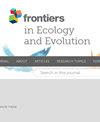Unveiling soil bacterial ecosystems in andean citrus orchards of Santander, Colombia
IF 2.4
3区 环境科学与生态学
Q2 ECOLOGY
引用次数: 0
Abstract
Citrus cultivation is vital to global agriculture, necessitating a comprehensive understanding of the soil microbiome’s diversity for sustainable practices. This study provides initial insights into the bacteriome in citrus crops in Santander, Colombia, employing a holistic approach combining culture-based techniques, sequencing methods, and bioinformatics analyses. The study explores organic and non-organic cultivation systems, revealing statistically significant differences in bacterial community composition between both practices. In general, the communities are dominated by members of the Actinobacteria and Proteobacteria, along with bacterial orders Gaiellales and Burkholderiales, all contributing to intricate ecological processes. Culture-based methods aided in the isolation of potential biotechnologically relevant strains. Among them, strain CP102 showed a pronounced carboxymethylcellulose (CMC) degradation capacity. Genetic analysis of the isolate resulted in the generation of the first closed genome of a member of the species Enterobacter soli and identified an unreported 109 kb plasmid. Further genomic examination revealed genes potentially associated with cellulose degradation in this species, which provides the isolate with biotechnological potential. This research significantly advances the global understanding of citrus-associated bacteriomes, shaping future agricultural practices and promoting the development of sustainable bioproducts.揭开哥伦比亚桑坦德山地柑橘园土壤细菌生态系统的神秘面纱
柑橘种植对全球农业至关重要,因此有必要全面了解土壤微生物组的多样性,以实现可持续发展。本研究采用一种综合方法,将基于培养的技术、测序方法和生物信息学分析相结合,对哥伦比亚桑坦德柑橘作物中的细菌群进行了初步了解。该研究探讨了有机和非有机栽培系统,发现这两种栽培方式的细菌群落组成在统计学上存在显著差异。一般来说,群落主要由放线菌和变形菌以及盖拉菌目和伯克霍尔德菌目细菌组成,它们都对复杂的生态过程做出了贡献。基于培养的方法有助于分离潜在的生物技术相关菌株。其中,菌株 CP102 显示出明显的羧甲基纤维素(CMC)降解能力。对该分离菌株进行基因分析后,首次产生了溶解肠杆菌的封闭基因组,并发现了一个未报道的 109 kb 质粒。进一步的基因组检查发现了该物种中可能与纤维素降解有关的基因,这为该分离物提供了生物技术潜力。这项研究极大地促进了全球对柑橘相关细菌群的了解,从而影响了未来的农业实践,并推动了可持续生物产品的开发。
本文章由计算机程序翻译,如有差异,请以英文原文为准。
求助全文
约1分钟内获得全文
求助全文
来源期刊

Frontiers in Ecology and Evolution
Environmental Science-Ecology
CiteScore
4.00
自引率
6.70%
发文量
1143
审稿时长
12 weeks
期刊介绍:
Frontiers in Ecology and Evolution publishes rigorously peer-reviewed research across fundamental and applied sciences, to provide ecological and evolutionary insights into our natural and anthropogenic world, and how it should best be managed. Field Chief Editor Mark A. Elgar at the University of Melbourne is supported by an outstanding Editorial Board of international researchers. This multidisciplinary open-access journal is at the forefront of disseminating and communicating scientific knowledge and impactful discoveries to researchers, academics and the public worldwide.
Eminent biologist and theist Theodosius Dobzhansky’s astute observation that “Nothing in biology makes sense except in the light of evolution” has arguably even broader relevance now than when it was first penned in The American Biology Teacher in 1973. One could similarly argue that not much in evolution makes sense without recourse to ecological concepts: understanding diversity — from microbial adaptations to species assemblages — requires insights from both ecological and evolutionary disciplines. Nowadays, technological developments from other fields allow us to address unprecedented ecological and evolutionary questions of astonishing detail, impressive breadth and compelling inference.
The specialty sections of Frontiers in Ecology and Evolution will publish, under a single platform, contemporary, rigorous research, reviews, opinions, and commentaries that cover the spectrum of ecological and evolutionary inquiry, both fundamental and applied. Articles are peer-reviewed according to the Frontiers review guidelines, which evaluate manuscripts on objective editorial criteria. Through this unique, Frontiers platform for open-access publishing and research networking, Frontiers in Ecology and Evolution aims to provide colleagues and the broader community with ecological and evolutionary insights into our natural and anthropogenic world, and how it might best be managed.
 求助内容:
求助内容: 应助结果提醒方式:
应助结果提醒方式:


